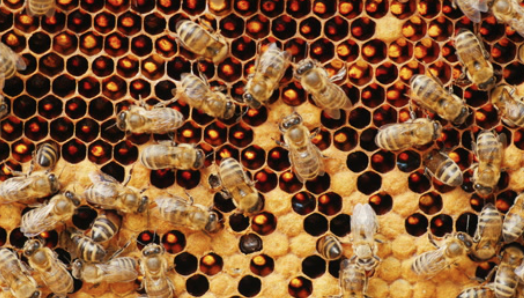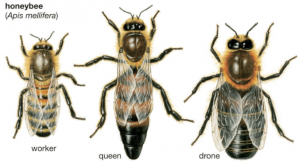I have been an apiarist (beekeeper) (as a hobby) for about 18 months, I now have 2 bee hives (a kind of project portfolio in its infancy). As with any hobby, the more time you invest in it, the more you begin to understand it. One of the most surprising observations I have regarding how a bee colony organises itself, is that bees are incredible project managers and have very mature project management processes.

The Bee org chart:
- 1 x queen bee (Sponsor, responsible of resource procurement (laying eggs)
- 5% of the colony are the drones (male bees, responsible for providing input into the resource procurement process (trying to avoid being graphic at this point)
- 95% of the colony is the worker bees (female bees, responsible for everything else ie building the comb, preparing a cell for the egg, nursing the larvae, maintaining the hive, defending the hive and foraging for pollen and nectar). They fit a lot of work in, considering they only live about 6 weeks.

Bee Politics:
- The Queen is not a dictator, but rather a full-time egg layer (single tasking resource), her position is safe only as long as she is delivering value (laying eggs and giving off pheromones). If either is affected, then the worker bees may choose to replace the queen (Supersedure).
- The Drones (Males) are like contractors, brought in for a specific job (fertilising a queen from another colony). Come the winter when the need for reproduction is gone, the worker bees forcibly remove the drones from the hive, where they will either die from exposure or starvation.
- The workers are the true collective power and hardest working hence their shorter life span.
So what are these other similarities with project management?
Well, just as a bee colony relies on effective organization and coordination to thrive, project management is crucial for the success of any endeavour. The analogy of a bee colony highlights the importance of project management in achieving goals, maximizing efficiency, and ensuring the smooth functioning of a team.
In a bee colony, each bee has a specific role and responsibility based its age, whether it’s foraging for nectar, building the hive, or caring for the young. Similarly, in a project, team members have different roles and tasks that contribute to the overall objective. Project management ensures that these roles are clearly defined, and everyone understands their responsibilities and how they fit into the bigger picture.
Just as bees communicate through intricate dances and pheromones, effective project management facilitates clear and open communication among team members. It establishes channels for sharing information, updates, and feedback, enabling collaboration and problem-solving. Like bees, project teams need to be in constant communication to adapt to changing circumstances and make informed decisions.
A bee colony operates with a high level of organization and efficiency. Bees work together seamlessly, following a set of protocols and processes to achieve their goals. Similarly, project management establishes frameworks, methodologies, and timelines to guide the team’s activities. It ensures that tasks are prioritized, resources are allocated effectively, and deadlines are met.
Just as a bee colony requires a queen bee to provide direction and guidance, project management provides leadership and direction to the team. A project manager sets the vision, defines the objectives, and establishes a roadmap for success. They monitor progress, identify, and mitigate risks, and make necessary adjustments to keep the project on track.
Furthermore, just as a bee colony relies on the collective efforts of all its members, project management fosters teamwork and collaboration. It encourages individuals to work together, leveraging their unique skills and strengths to achieve shared goals. Project managers facilitate cooperation, resolve conflicts, and create an environment that promotes trust and mutual support.
Lastly, just as a bee colony thrives when it is well-maintained and cared for, project management ensures the project’s sustainability and long-term success. It involves monitoring and evaluating the project’s performance, learning from past experiences, and implementing improvements for future projects. Project management is a continuous process of reflection, adaptation, and growth.
In conclusion, the analogy of a bee colony highlights the importance of project management in achieving success. Just as bees rely on organization, communication, efficiency, leadership, teamwork, and continuous improvement, project management provides the necessary structure and guidance for teams to accomplish their objectives. By embracing effective project management practices, we can ensure the smooth functioning of projects, maximize productivity, and achieve desired outcomes.
So even though we have been bee keeping for at least 15,000 years, Bees have been around for approx. 27 million years. In that time, they have evolved very mature project management approaches and practices that we can only hope to aspire to in business.

Leave a Reply